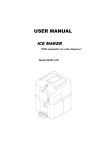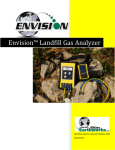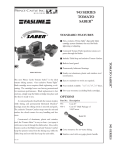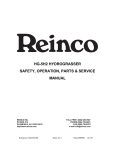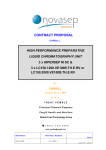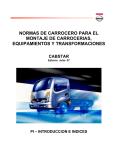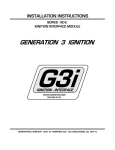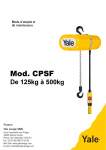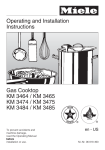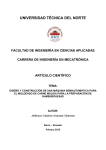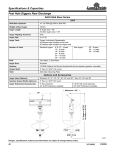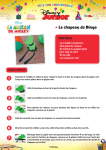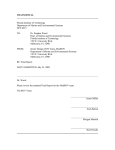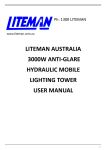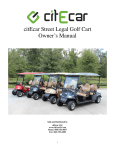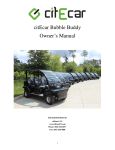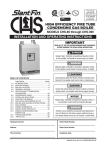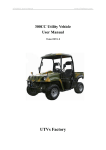Download - Eaglehawk Hire
Transcript
DINGO® K9-2 Handyman OPERATION & MAINTENANCE MANUAL IMPORTANT: Become familiar with the contents of this manual before operating the Dingo. This Manual contains Safety, Operation and Warranty Information. Also become familiar with the controls & their proper use before operating the Dingo. JUNE 2012 Contents Introduction .......................................................................................... 4 Safety ....................................................................................................... 5 General Operation..............................................................................5 Operating on Uneven Ground...........................................................6 Children...............................................................................................6 Service................................................................................................6 Safety and Instruction Decals...........................................................7 Specifications ..................................................................................... 8 Operation - Pre Start-Up ................................................................ 9 Pre Start-Up (daily).............................................................................9 Adding Fuel........................................................................................9 Checking the engine oil...................................................................10 Remove Debris from the Machine..................................................10 Tyres and Traction............................................................................10 Operating Instructions .................................................................10 Control Levers / Control Panel.......................................................10 Key Switch ..................................................................................11 Throttle ......................................................................................11 Choke .........................................................................................11 Drive Control Levers ....................................................................11 Attachment Tilt Lever ...................................................................11 Loader Arms Lever ......................................................................11 Control Panel Diagram .................................................................11 Auxiliary Hydraulic lever ..............................................................11 Pump Selector Lever ...................................................................11 Starting the Engine..........................................................................12 Stopping the Engine........................................................................12 Stopping the Dingo..........................................................................12 Moving a Non Functioning Dingo...................................................12 Using Cylinder Locks......................................................................12 Attachments ......................................................................................12 Connecting.......................................................................................12 Disconnecting..................................................................................13 Transporting and Securing ........................................................13 2 Dingo K9-2 Operation & Maintenance Manual Contents Maintenance ......................................................................................13 Air Filter............................................................................................14 Bushes & Pins..................................................................................14 Engine Oil.........................................................................................14 Changing Oil Filter......................................................................14 Spark Plugs......................................................................................14 Changing Tyres................................................................................14 Hydraulic System.............................................................................14 Battery...............................................................................................15 Cleaning and Long Term Storage...................................................15 Troubleshooting ..............................................................................16 Warranty Statement .......................................................................17 Dingo K9-2 Operation & Maintenance Manual 3 Introduction Congratulations on purchasing the World’s Toughest Mini Digger. Dingo- The World's first Mini Digger and still the market leader The Dingo Handyman K9-2 completes the toughest jobs in the smallest places By purchasing a Dingo you have obtained a machine of the highest quality and we want you to be totally satisfied as our customer. Please feel free to contact any of our branches for assistance with service, genuine replacement parts, operational tips and any other form of information you may require. The information in this manual is current as of June 2012. As Dingo Australia continuously improves products, Dingo Australia reserves the right to change specifications without notice. For any further information, contact you nearest Dingo Australia branch on 1300 4DINGO or www.dingo.com.au. When contacting us please have your Dingo Chassis and Model numbers. These details enable us to know the specifications of your Dingo. Dingo Chassis Number Dingo Model Number Engine Type & Serial Number Date Purchased Name Address DISCLAIMER: Specifications, design & service procedures are subject to change without notice. Specifications may vary & may be approximate. We reserve the right to correct errors or misprints. 4 Dingo K9-2 Operation & Maintenance Manual Safety General Operation Read, understand, and follow the instructions in the operation and maintenance manual before using the Dingo. Improper use can result in injury. Keep hands, feet and clothing away from all moving parts. Allow only responsible adults who are familiar with the Dingo and its operation to use the Dingo. It is the operators responsibility to operate away from pedestrians and establish appropriate isolation measures. Never carry passengers, and keep pets and bystanders away from the Dingo. Always lower Dingo arms and/or place attachment on the ground when parking or leaving the Dingo unattended. Always stop the engine if leaving the operators platform. IMPORTANT Do not carry a load or heavy attachment with the Dingo arms in a raised position. Do not step off the platform with a load raised. Never jerk the control levers. Use a steady motion. Slow down before turning. Sharp turns may cause loss of control. Stop the engine before making any adjustments to the attachments or the machine. WARNINGNever weld on or near the fuel tank whether it is empty or full. Do not refuel with the engine running, or while you or someone near is smoking. Do not operate on or near embankments. Look out for ditches, holes, etc. and beware of traffic when near roads. Do not operate any of the control levers (including auxiliary lever) unless you are standing with both feet on the platform and firmly holding the grip handles. Operate only in daylight or good artificial lighting. Wear appropriate clothing including hard hat, safety glasses, long pants, and safety shoes. Do not operate equipment while under the influence of alcohol or drugs, or while otherwise impaired. Do not exceed the rated operating capacity. Use extra care while loading or unloading the Dingo onto a trailer or truck. Do not place feet under the platform. Do not touch equipment or attachment parts that may be hot from operation. Allow to cool before attempting to maintain, adjust or service. Watch where you are driving. Always look down and behind, before and while reversing. WARNING Engine exhaust contains Carbon Monoxide, which is an odourless, deadly poison. Carbon Monoxide can kill you. Do not run engine indoors or in a confined space. Never let children or untrained people operate or service the Dingo. REMEMBER - Safety is your responsibility. Dingo K9-2 Operation & Maintenance Manual 5 requires extra caution If machine becomes unstable, jump clear. Never try to stabilise the machine by putting your foot on the ground. Do not operate on uneven ground exceeding 15 degrees. Children Operating on Uneven Ground Always have the heavy end of the machine uphill. Weight distribution will change. An empty bucket will make the rear of the machine heaviest, a loaded bucket will make the front of the machine heaviest. Various attachments will change which end is heaviest. These same rules apply when loading and unloading the Dingo onto a trailer or truck. If a slope is greater than 5 degrees, only go up or down - not across. Reduce speed over rough or uneven ground, to reduce the likelihood of machine rollover. Avoid turning on uneven ground. If you must turn, turn slowly keeping the heavy end of the machine uphill. Do not operate near ditches or embankments, the machine could turn over if a wheel goes over the edge of a cliff or ditch or the edge caves in. Use caution when operating on wet grass, reduced traction could cause wheel slip. Remove obstacles such as rocks, tree limbs, etc from the work area. Watch for ruts or bumps as uneven terrain could overturn the machine. Tall grass can hide obstacles. Operate in slow speed. Put pump selector valve in slow (turtle) position so that you will not have to stop or shift while on the uneven ground. If parking on uneven ground or hillsides always lower the Dingo arms and attachment to the ground and chock the wheels. 6 Be wary of the presence of children when operating a Dingo. Keep children out of the work site and under the watchful care of a responsible adult. Be alert and turn the machine off if children enter the area. Never carry children (or anyone) on the Dingo or any of its attachments. Do not allow children to play on the Dingo or within the Dingo work site (aside from the danger of working machinery there may be holes into which a child could fall or various other dangers). Do not allow children to operate the machine. Before reversing look behind and down for small children. Be aware of blind corners, shrubs, trees, or ends of fences that may obscure vision. Service Should be performed by an authorised Service Agent Before performing any service, repairs, maintenance or adjustment, stop the engine and remove the key. Never run the machine in an enclosed area. Perform all maintenance with the Dingo arms fully lowered. If Dingo arms need to be raised to perform tasks, secure them in the raised position by using cylinder locks or a safety stand. (Contact a Dingo representative if you are unsure) Dingo K9-2 Operation & Maintenance Manual Keep the machine free of grass, leaves, or other debris build up. Clean up oil or fuel spillage. Allow the machine to cool before storing. Use extra care when handling petroleum and other fuels. They are flammable and vapours are explosive. • Use only an approved container. • Never remove the fuel cap or add fuel while the engine is running. Allow engine to cool before refuelling. Do not smoke. • Never refuel the machine indoors. • Never store the machine or fuel container inside where there is an open flame, such as near a water heater or furnace. • Never fill a container while it is inside a vehicle, car boot, utility tray or any surface other than the ground. • Keep container nozzle in contact with the tank during filling. WARNING Hydraulic fluid escaping under pressure can penetrate the skin and cause injury. Keep hands and body away from pin hole leaks or nozzles that eject high pressure hydraulic fluid. A small leak can be dangerous. If you suspect a leak contact a Dingo Australia Authorised Service Technician. Safety and Instruction Decals It is important to replace any damaged or missing decals. Part number: 021-000-071 Stop and inspect equipment if you strike anything or hear any strange noise coming from the machine. If necessary repair machine before starting again. Use only genuine replacement parts to ensure that original standards are maintained. This machine is provided with a maintenance free battery. Do not attempt to service or adjust battery fluid levels. If battery will not hold charge replace with a battery of the same type. In the event that a battery leaks or case is damaged, handle using appropriate personal protective equipment and dispose of in accordance with local requirements. Dingo K9-2 Operation & Maintenance Manual 7 Specifications Engine Make Vanguard (Petrol) Power 18HP / 13.5kW Performance Hydraulic Pumps 2 pumps Auxiliary Flow 32.4 l/min Relief Pressure (Aux) 200 bar (2900psi) Travel Speed 0-5.5 km/h Rate Lift Capacity Safe Working Load SWL: 125 kg Max Wokring Load MWL: 250 kg Wheel Motors4 Auxiliary Hydraulic Outlets 1 Dimensions A. Overall Width 780-940mm B. Overall Length1400mm C. Overall Height1200mm D. Maximum Operating Height 1902mm E. Turning Radius 1160mm F. Angle of Departure 27° G. Wheel Base650mm H. Ground Clearance150mm I. Dump Height Std Bucket 840mm J Height to Hinge Pin 1350mm K. Petrol Resevior 14L Hydraulic Reservoir34 l Machine Mass 540kg (approx) Warranty Engine Warranty2 Years / 1000 Hours* Product Warranty 2 Years / 1000hrs* F H I C J L D M E * warranty conditions apply (Specifications and design subject to change without notice.) G A 8 K B Dingo K9-2 Operation & Maintenance Manual Operation- Pre Start-Up Pre Start-Up (daily) Become familiar with this manual and the engine manual. Before commencing operation each day perform the following pre start checks; MACHINE Fuel level - fill to 60mm from the top ( do not overfill) Engine oil level (refer to engine manual) Remove all debris from the machine Check air filter and clean if necessary Check bushes and pins for wear Check tyre pressure (25-35psi) Check fans and cooling ventilation are clean and clear from obstruction Check for leaks (oil and fuel) Check for any damaged & loose components IMPORANT Check wheel nuts (85flb/115nm) daily for first 6 days of operation OPERATOR Operator has been trained in safe use of machine Operator is competent for the intended use (including competent in the use of relevant attachments) Operator has appropriate clothing and personal protective equipment; • Fully enclosed non slip footwear (safety boots) • Long pants and shirt • Safety glasses • Hard hat if working in areas with a risk of falling items or overhead obstacles • Hearing protection Operator is supervised if undergoing training WORK AREA Ground conditions are firm and stable Sloping ground has been identified Holes have been identified and isolated Embankments have been marked Tree stumps, rocks and other hazards have been identified Water courses (dams, creeks, rivers) have been clearly marked Underground and aboveground services have been identified and isolated if necessary Site physical hazards have been identified Dust, noise, traffic and other adverse conditions have been controlled Persons not involved in the work have been excluded from the area. Children and animals have been removed from the area Adding Fuel Labelling on the fuel tank tells whether a machine requires petroleum fuel. For fuel type and information on suitable additives refer to Engine Manual as supplied. (NB. If labelling becomes lost or damaged order replacements from your Dingo representative) & fit to machine. For recommended fuel see Engine Manual. 1 Position Dingo on level surface, lower the Dingo arms and turn off the engine (turn ignition key to off). Remove the key. 2 Clean around the fuel tank cap and remove the cap. Use a funnel to add fuel as specified above to the fuel tank, filling until the fuel reaches 60 - 70 mm below the top of the tank. This space is needed to allow the fuel room to expand. Do not fill the fuel tank completely full. 3 Replace the fuel cap securely. Clean away any fuel that may have spilt. DANGER - Petroleum can be extremely flammable and highly explosive. To avoid a fire or explosion that may burn yourself, other, or cause property damage:- Dingo K9-2 Operation & Maintenance Manual 9 Ensure that the Dingo is outdoors, in an open area, when the engine is cold. • Clean up any petrol spills.• Do not completely fill the fuel tank. Follow guidelines above. • Never smoke while handling fuels, and stay away from an open flame or any place that a spark may ignite petroleum fumes. • Store fuels in an approved container, out of reach from children. Never buy more than a 30 day supply of fuel. Checking the Engine Check the engine oil level using the dip stick. (Refer to your engine manual for details) Remove Debris from the Machine IMPORTANT: Overheating will result if the engine is operated with a blocked grass screen, dirty or plugged cooling fins, and/ or cooling shrouds removed. The hydraulic system will keep cooler if the machine is free from debris on the hydraulic tank and fittings, and hydraulic cooler. Park the machine on a flat surface, lower the Dingo arms and turn off the engine. Remove the key. Check air filter for debris. If required, wipe away debris before and during each use. Debris can build up in the engine area. Clean any debris build-up with a brush or blower before each use. IMPORTANT: It is preferable to blow out dirt than to wash it out. Do not put water directly onto the electrical system or ignition system. IMPORTANT: Do not high pressure wash. High pressure washing can damage the electrical system. 10 Tyres and Traction WARNING Dingo Tyres should be filled with water. Failure to do so will affect weight distribution, and can drastically reduce the stability and carrying capacity of the machine. Use of incorrect tyre pressure will also reduce the stability and carrying capacity of the Dingo. The correct tyre pressure is usually between 25 to 35 PSI. Various types of equipment are available for filling tyres with water. Filling equipment can also be purchased from Dingo Mini Diggers. You should also be aware that the tyres fitted to your machine may not be the most suitable for all work environments and there is a range of traction equipment to suit every application.For more information on our range of traction products, please speak to your nearest Dingo Representative. Operating Instructions Read all the safety instructions and the pre start up section of this manual and the engine manual before operating the Dingo. Caution - Do not operate any of the control levers (including auxiliary lever) unless you are standing with both feet on the platform and firmly holding the grip handles. IMPORTANT! (The K9-2 comes standard with a spring detent in the Auxiliary lever for safety. If a three position detent is fitted - never leave the operators platform with detent engaged.) Ensure the auxiliary hydraulic lever is in the centre position before attempting to start engine. The most common cause of ‘hard to start/engine, will not turn over fast enough, battery does not have enough power’ type starting problems is that the auxiliary lever has been left on or knocked into gear and the engine is trying to start under load. Dingo K9-2 Operation & Maintenance Manual Control Levers / Control Panel Control Panel Diagram Key Switch The key switch, used to start the engine. Check engine manufacturer's manual for starting instructions. To shut engine off, rotate key to OFF position (counter clockwise direction). Throttle Move control upward to increase engine speed and downward to decrease engine speed. Choke For instructions regarding use of the choke (petrol models) refer to the engine manufacturers manual. Drive Control Levers To go forward, slowly push the right and left drive control levers forward. To go backward, slowly pull the right and left drive control levers backward. To go straight, apply equal pressure to both drive control levers. To turn, decrease pressure on the drive control lever closest to the direction you want to turn. The farther you move the drive control levers in either direction, the faster the machine will move in that direction. To slow or stop, move or release the drive control levers into neutral. (If released the control levers will automatically return to neutral). The Dingo is capable of turning on the spot by applying equal power to each drive lever in opposite directions. Attachment Tilt Lever To tilt/crowd attachment forward, slowly push the tilt lever forward. To tilt attachment backward, slowly pull the tilt lever backward. Loader Arms Lever To lower Dingo arms, slowly push arm lever 1 2 3 4 5 Drive Control Levers Attachment Tilt Lever Loader Arms Lever Auxiliary Hydraulic Lever Pump Selector Valve Auxiliary Hydraulic lever The auxiliary hydraulics lever allows you to alter the direction of rotation of hydraulically driven attachments or stop them completely. ATTENTION:E nsure auxiliary hydraulic lever is in neutral position before starting engine. Aside from starting difficulties the attachment may move during starting. To operate attachment in forward direction, slowly pull auxiliary lever rearward. To operate attachment in reverse direction, slowly push auxiliary lever forward. Pump Selector Lever When faster ground speed and lifting speed is required (bucket work) more than attachment speed and power, push the pump selector lever to the forward position (Hare). When faster attachment speed and power is required (trenching, post hole digging etc) more than ground speed and lifting power, pull the pump selector lever to the rearward position (Turtle). Dingo K9-2 Operation & Maintenance Manual 11 Starting the Engine Stand on the platform. Move the auxiliary hydraulics lever to neutral. Follow instruction on starting engine as detailed in the engine manufacturer's manual. Stopping the Engine Refer to the engine manual. Note: If the engine has been working hard or is hot, let it idle for a minute before turning the ignition key to OFF. This helps cool the engine before it is stopped. In an emergency, turning the ignition key to OFF will stop the engine. Stopping the Dingo To stop the machine, move the drive control levers to neutral, lower Dingo arms to the ground, and turn the ignition key to OFF to stop the engine. Remember to remove the key from the key switch. If the machine is parked on a slope, chock the wheel. CAUTION! If children or bystanders attempt to operate the machine, someone could be injured. To avoid attempted use by children or bystanders while machine is unattended, remove the key from the ignition, even if just for a few minutes. Moving a Non Functioning Dingo The best way to move a non functioning Dingo is by forklift or crane. It is also possible to push or tow a Dingo without the use of the engine. . Please call your nearest Dingo service centre for more information. Using Cylinder Locks IMPORTANT: Normal maintenance should be completed with the Dingo arms lowered. 12 If maintenance or repairs requires the Dingo arms raised, use cylinder lock provided with Dingo. WARNING! Dingo arms may lower when in the raised position. To avoid this hazard always install cylinder locks or a safety stand. (Contact a Dingo representative for more information). Attachments Connecting IMPORTANT: Use only Dingo approved attachments. Attachments can change stability and operating characteristics of the machine. The warranty of the machine may be voided if used with unapproved attachments. IMPORTANT: Before connecting any attachments to the machine, make sure mount plates are free of any dirt and debris. 1 Move pump control lever to slow (turtle) position. 2 Slowly push the attachment tilt lever forward to tilt the attachment mount plate forward. 3 Position mount plate into the upper lip of the attachment’s receiver plate. 4 Raise the Dingo arms while tilting back the mount plate at the same time. 5 IMPORTANT: The attachment should be raised enough to clear the ground and the mount plate tilted all the way back. 6 Turn the ignition key to OFF to stop the engine. 7 Engage the attachment lock pins (the lock pins should go down 15mm as they turn). Note: Lock pins are located on the outer edge of the mount plate and should be turned towards the inside to engage. 8 Note: Proceed to next step if auxiliary hydraulics are required with attachment. 9 IMPORTANT: Make sure all foreign matter is cleaned from hydraulic connections before making connections. Dingo K9-2 Operation & Maintenance Manual 10 With the engine turned off move the auxiliary hydraulics lever to the forward, backward, and back to neutral position to relieve hydraulic pressure at the hydraulic couplers. 11 Remove protective plugs from the hydraulic couplers on the Dingo. Connect plugs together to prevent contamination during operation. 12 Slide collar back on hydraulic coupler and connect attachment couplers to machine couplers. There will be two connections to make. 13 Confirm that connection is secure by pulling on the hoses. Disconnecting 1 Lower attachment to the ground or onto a trailer. 2 Turn the ignition key OFF to stop the engine. 3 Move the auxiliary hydraulics lever forward, backward and back to neutral position to relieve hydraulic pressure at the hydraulic couplers. 4 Slide collar back on the hydraulic coupler and disconnect attachment couplers from machine couplers. (Note: if this is difficult return to step 3 and repeat). 5 IMPORTANT: Connect attachment hoses together to prevent contamination during storage. 6 Install protective covers onto Dingo's hydraulic couplers. 7 Disengage the attachment lock pins by turning them to the outside. 8 Start engine, tilt the mount plate forward and back machine away from the attachment. Transporting and Securing IMPORTANT: Observe local legislation if operating on roadways. IMPORTANT: When transporting Dingo on trailer, always use the following procedure. 1. Never load or unload the Dingo on the trailer unless the trailer is attached to the vehicle. 2. Always climb the ramps with the heavy end of the machine up hill. E.g. With heavy attachment like the trencher attached to the Dingo, climb the ramps in the forward direction. With no attachment on the Dingo, climb the ramps in the reverse direction. 3. The bucket, post hole digger and leveller attachment should always be positioned in their designated positions on the trailer. This will help ensure that the weight is distributed correctly on the trailer. 4. Ensure the load is positioned so that there is more weight forward of the trailer axle than behind the axle. Too much weight behind the axle may cause the rear of the vehicle to become too light. (refer to motor vehicle manufacturers recommendations) 5. Once in position on the trailer lower the Dingo arms 6. Turn the key to Off to stop the engine. 7. Remove the key, turn the fuel tap to the off position before transporting. 8. Secure the machine to the trailer with chains or straps using the tie down points on the Dingo chassis. 9. When towed by a vehicle not fitted with an electric trailer brake controller, engage the manual breaking system by lifting the manual override stopper on the tow coupling (single axle trailer only). Maintenance It is essential to maintain the engine as detailed in the engine manual. Refer to your log book service manual for this information. Refer to the Pre Start Up section for maintenance that should be completed before starting the Dingo (each and every time). Dingo K9-2 Operation & Maintenance Manual 13 Air Filter Engine Oil IMPORTANT: The air filter is of extreme importance. It ensures the air entering the engine is clean. Blocked or damaged air filters can greatly reduced engine life. The time interval between changes of air filter will depend on the operating conditions. Change of air filter is recommended as opposed to cleaning of the air filter. Refer to the engine manual for required frequencies of oil changes, oil types, crankcase capacity and viscosity. Check oil daily. In dusty conditions check air filters daily and replace if necessary. Spark Plugs Changing Oil Filter Refer to engine manual. Removing, checking and cleaning spark plugs - refer to engine manual. Never blow out your air filter with compressed air. If the filter or filter housing is damaged, stop the engine immediately and replace the damaged components. Failure to stop work when the air filter of housing is damaged could result in permanent damage. Changing Tyres Chock the wheels prior to jacking the machine. Use a suitable trolley jack or floor jack. Do not rely solely on the jack, place suitable stands to support the Dingo. Bushes & Pins Your Dingo has duralon bushes and chrome pins in the arm joints. These bushes/bearings are wear parts and require regular inspection. (Once a week) To check the condition of the bushes: 1 Remove attachment from the front of the Dingo 2 Raise the arms until the mount plate is at waist height 3 Grab the mount plate and wriggle back and forth to try and identify any movement in any of the joints in the mount plate 4 Grab the arms and wriggle up and down to detect any movements in joints in the arms. If bushes show signs of any wear contact your Dingo Australia Authorised Service Agent. A little wear quickly becomes a big and expensive problem if not attended to. It is a simple job and is easily fixed if detected in time. 14 Jack Dingo at Front Centre of Chasis Jack Dingo at Rear Centre Foot Plate Hydraulic System - check hydraulic level visually The Hydraulic oil type and viscosity is the most important compnoent of a hydraulic system. Cleanliness is paramount. Volume is next. However, if no leaks are visable, it is better to not removed the cap except when suspicious volume may have changed. Dingo K9-2 Operation & Maintenance Manual Battery Always keep the battery clean and fully charged. Use a paper towel to clean the battery case. Apply a coating of battery terminal protector to reduce corrosion. Voltage: 8.5 AMP, 130 CCA motorbike type battery. If battery becomes flat or machine is not used for a long period, charge the battery using an external battery charger. Disconnect battery terminals before charging the battery. Do not rely on the engines charging system to recharge a battery. It is only meant to maintain charge in a good battery. To pull start see engine manual. Dingo K9-2 Operation & Maintenance Manual 15 Troubleshooting Problem Starter does not crank . . . Engine will not start, hard to start or fails to keep running . . . . . . . . . . Engine looses power . . . . . . . Engine overheats . . . . . Abnormal vibration . Machine does not drive 16 . . . . Possible Causes Corrective Action 1. Battery is dead 1. Charge battery 2. Electrical connections are corroded or loose 2. Check electrical connections for good contact 3. Faulty Ignition Switch 3. Replace Ignition Switch 1. Auxiliary hydraulics lever is not in neutral position 1. Move the lever to neutral position . 2. Fuel tank is empty 2. Fill fuel tank with appropriate fuel 3. Choke is not on (petrol models) 3. Move choke to ON 4. Spark plug wires are loose or disconnected. (petrol models) 4. Install wire on spark plug . 5. Air cleaner is dirty 5. Clean or replace air cleaner element 6. Spark plugs are pitted, fouled, or gap is incorrect (petrol Models) 6. Install new, correctly gapped spark plugs . 7. Dirt in fuel filter 7. Replace fuel filter 8. Dirt, water or stale fuel in the fuel tank 8. Drain fuel tank and filter and replace fuel 9. Dirt, water or stale fuel in the fuel system 9. Contact authorised dealer 1. Engine load is excessive 1. Reduce ground speed 2. Air cleaner is dirty 2. Clean or replace air cleaner element 3. Oil level in crankcase is low 3. Add oil to crankcase 4. Cooling fins and air passages under engine blower housing are blocked 4. Remove obstruction from cooling fins and air passages 5. Spark plugs are pitted, fowled, or gap is incorrect (petrol Models) 5. Install new, correctly gapped spark plugs . 6. Dirt in fuel filter 6. Replace fuel filter 7. Dirt, water or stale fuel in the fuel tank 7. Drain fuel tank and filter and replace fuel 8. Dirt, water or stale fuel in the fuel system 8. Contact authorised dealer 1. Engine load is excessive 1. Reduce ground speed 2. Oil level in crankcase is low 2. Add oil to crankcase 3. Cooling fins and air passages under engine blower housing are blocked 3. Remove obstruction from cooling fins and air passages 1. Engine mounting bolts are loose 1. Tighten engine mounting bolts 2. Engine mounts are broken 2. Replace engine mounts 1. Hydraulic fluid level low 1. Add hydraulic fluid to reservoir 2. Traction pump drive coupler is loose or broken 2. Contact authorised service dealer 3. Pump and/or wheel motor is defective or damaged 3. Contact authorised service dealer . 4. Control valve is defective or damaged 4. Contact authorised service dealer 5. Relief valve is defective or damaged 5. Contact authorised service dealer Dingo K9-2 Operation & Maintenance Manual WARRANTY STATEMENT DINGO MINI DIGGERS PTY LTD (ACN 060 840 011) POLICY DINGO MINI DIGGERS PTY LTD warrants to the original buyer/owner that each new Dingo™ will be free from any proven defects in the material or workmanship for a period of twenty-four (24) months or 1000 hours, whichever is sooner, after the delivery to the owner provided that: 1. The Dingo has been properly and reasonably used, operated, maintained and regularly serviced. 2. All replacement or repair is authorised by DINGO MINI DIGGERS PTY LTD or an authorised DINGO MINI DIGGERS dealer. This refers to all Dingo parts, excluding motor and battery as outlined below. During the warranty period, DINGO MINI DIGGERS or their authorised dealer shall repair or replace, at their option, without charge for parts and labour, any part of the Dingo which fails because of defects in the workmanship or materials. The owner shall advise DINGO MINI DIGGERS or their authorised dealer immediately of any defect and allow reasonable time for replacement or repair. Travel time for servicemen and transportation of the Dingo to DINGO MINI DIGGERS or the dealers premises for warranty work are the owners responsibility. WARRANTY EXCLUSIONS This warranty does not cover: 1. Tyres, track components or other consumables or service parts (nuts and bolts, trencher teeth, etc) replaced as part of a normal maintenance service as opposed to manufacturing defects. 2. Damage resulting from abuse, negligence, accidents, alterations, air flow obstructions, or failure to maintain or use the machine according to the instructions given. 3. Downtime expenses, lose of machine use, rental of another machine or related equipment while repairs are in progress, or other incidental, consequential, or special damages. 4. Communication expenses such as Telephone and Facsimile. 5. Travel time for servicemen. 6. Transportation and Insurance charges for transportation of the failed Dingo. 7. Any labour, parts, mechanical adjustments or lubricant expenses which Dingo Mini Diggers Pty Ltd or an authorised Dingo Mini Digger dealer considers should be made as a standard maintenance procedure according to the Dingo maintenance guidelines listed in this manual. 8. Any defect caused by work carried out without the authorisation of Dingo Mini Diggers Pty Ltd or an authorised Dingo Mini Digger Dealer. 9. Damage caused by continued use of the machine after it is known to be defective. 10. Damage caused by overloading or by racing and similar activities. Dingo K9-2 Operation & Maintenance Manual 17 This warranty is in lieu of all other warranties, expressed or implied, and there are no warranties of merchantability or fitness for a particular purpose. The benefits conferred by this warranty are in addition to all other rights and remedies in respect of the product which the consumer has under the Trade Practices Act (Commonwealth) and the Fair Trading Act of Queensland. Machines of this type can be dangerous if used carelessly or improperly. The manufacturer, distributor or selling agent does not accept responsibility for accident either to the operator, to the owner or to any person directly or indirectly or to property if such an accident is caused by circumstances arising otherwise than by the negligence or default of Dingo Mini Diggers Pty Ltd. PARTS INSTALLED DURING MACHINE WARRANTY Components installed during a machines warranty period shall have warranty coverage for the duration of the machine warranty period or ninety (90) days, which ever is greater, provided the warranty installation is performed by Dingo Mini Diggers Pty Ltd or an authorised Dingo Mini Digger dealer. ENGINE POLICY The engine in a new Dingo Mini Digger is covered by the manufacturer of that specific engine, not by Dingo Mini Diggers Pty Ltd. The engine owners manual will have details of the cover provided. BATTERY POLICY The Battery in a new Dingo Mini Digger is covered by the manufacturer of that specific battery under that companies normal warranty policy. N.B. Dingo Mini Diggers Pty Ltd reserve the right to change at any time the Dingo Mini Digger product specifications, configurations, and company policies, this is due to our constant commitment to make the best product for the job. 18 Dingo K9-2 Operation & Maintenance Manual Notes ................................................................................................... ................................................................................................... ................................................................................................... ................................................................................................... ................................................................................................... ................................................................................................... ................................................................................................... ................................................................................................... ................................................................................................... ................................................................................................... ................................................................................................... ................................................................................................... ................................................................................................... ................................................................................................... ................................................................................................... ................................................................................................... ................................................................................................... ................................................................................................... ................................................................................................... ................................................................................................... ................................................................................................... ................................................................................................... ................................................................................................... ................................................................................................... ................................................................................................... ................................................................................................... ................................................................................................... ................................................................................................... ................................................................................................... ................................................................................................... ................................................................................................... ................................................................................................... Dingo K9-2 Operation & Maintenance Manual 19 Proudly manufactured by Dingo Mini Diggers Pty Ltd 9 Owen Street East Dalby Qld, 4405 Australia LOCATED THROUGHOUT AUSTRALIA 1300 4 DINGO NEW ZEALAND 0011 64 7378 9840 DINGO.COM.AU




















